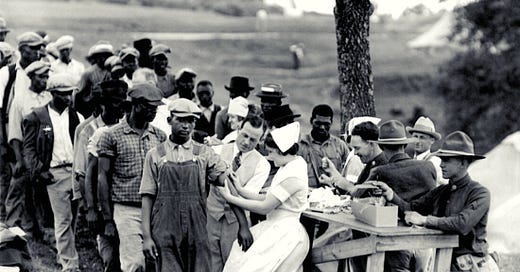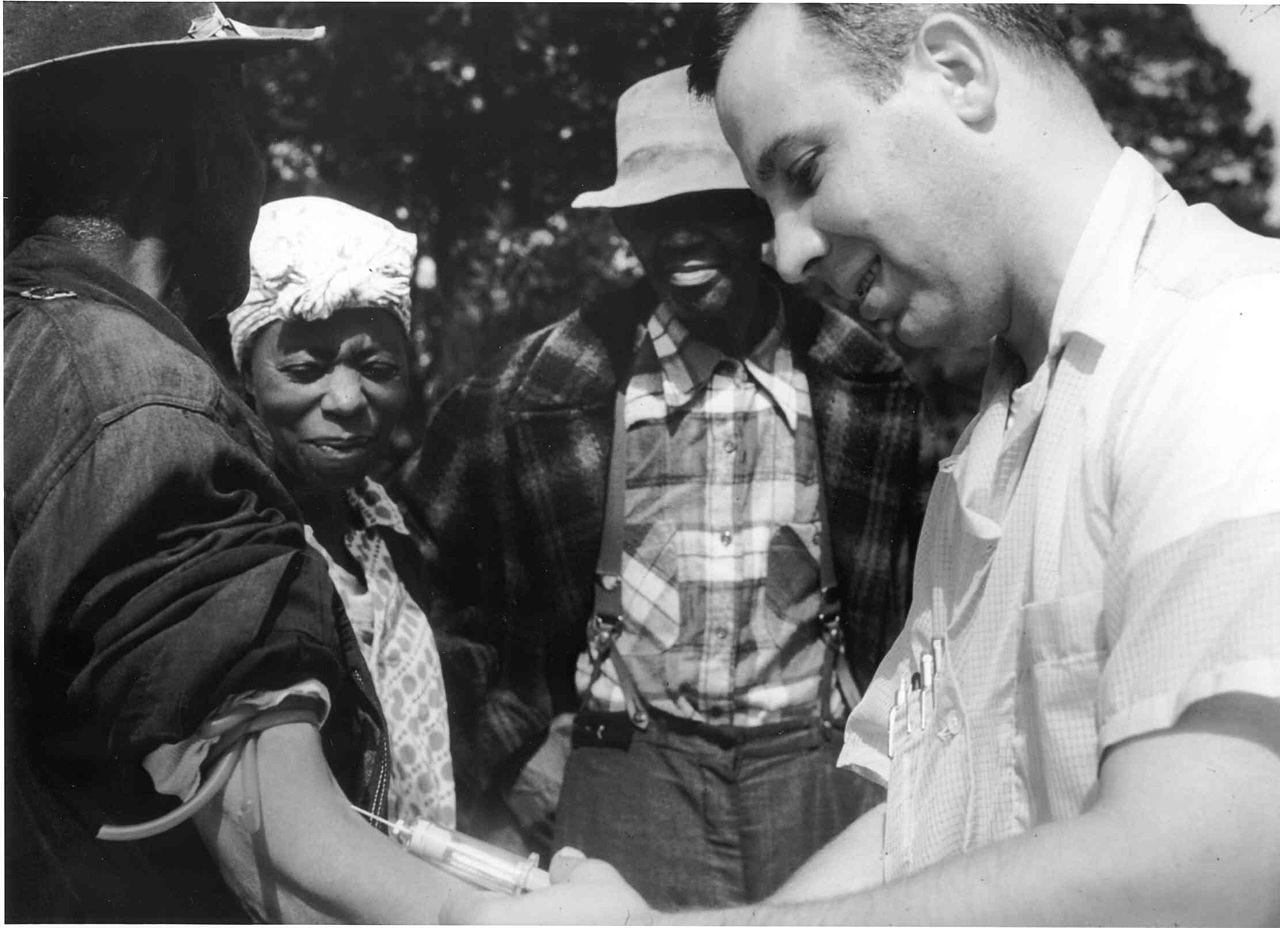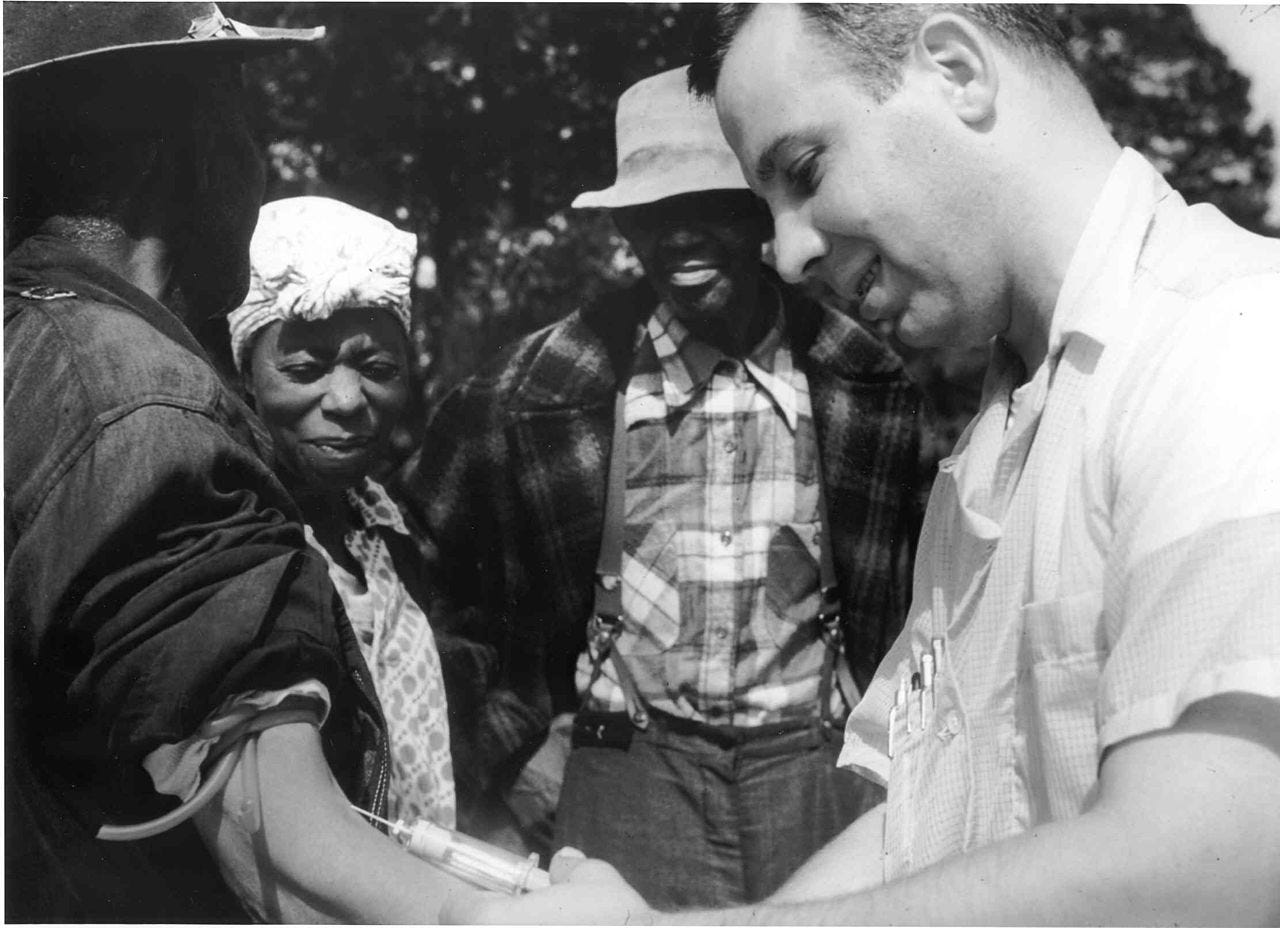Tuskegee Experiment, the Infamous Syphilis Study on Poor Black Men
At Tuskegee, the U.S. government experimented on black men with syphilis for 40 years. No consent was ever obtained from the men, and they were never told that they were not being treated.
A Shameful Chapter of American History
It has been two since the cold-blooded killing of George Floyd, and the horrific event continues to trigger violent unrest and spark uncomfortable debates on #BlackLivesMatter across the world. This year also marks the 50th anniversary of yet another grim milestone in the history of racial crimes in the U.S.
On May 16, 1997, President Bill Clinton looked solemnly at the five elderly African-American men attending a special white house ceremony and said, "I am sorry."
The president was apologizing for one of American history's most shameful chapters: the infamous "Tuskegee Experiment.” Also officially called the “Tuskegee Study of Untreated Syphilis in the Negro Male,”
The study recruited 600 black men, of which 399 were diagnosed with syphilis and 201 were a control group without the disease. No consent was ever obtained from the men, and they were never told that they were not being treated but simply being watched until they died and their bodies could be examined to study the disease further.
Exposed by a whistle-blower in the early 1970s, the experiment was stopped. Still, the infamous experiment remains one of the most glaring examples of discrimination and racism within the U.S. medical system.
As Dr. David M. Carlisle rightly said.
“You cannot think of a more damning betrayal of a doctor-patient relationship than that,”
The “Promise” of Free Treatment
In the fall of 1932, large black and white fliers began to appear in selected Alabama areas promising free treatment for black people with "bad blood."
The signs said,
“YOU MAY FEEL WELL AND STILL HAVE BAD BLOOD. COME AND BRING ALL YOUR FAMILY.”
Hundreds of poor black people signed up, thinking they were being treated for rheumatism or bad stomachs. They were promised free meals, free physicals, and free burial insurance.
James H. Jones, the author of the book Bad Blood: The Tuskegee Syphilis Experiment, records the testimony of one of the survivors, Charles Pollard.
“So, I went over, and they told me I had bad blood. And that is what they've been telling me ever since. They come around from time to time and check me over, and they say, 'Charlie, you've got bad blood."
What Charles Pollard did not know was that he was part of a secret experiment conducted by the U.S. Public Health Service to study the progression of the deadly venereal disease syphilis — without any treatment given or consent taken.
The Illegal Syphilis Study
The study was meant to discover how syphilis affected blacks as opposed to whites, the theory being that whites experienced more neurological complications from syphilis. In contrast, blacks were more susceptible to cardiovascular damage.
Although the merit of the findings and how the knowledge would have changed the treatment of syphilis is unconfirmed, one thing is sure. Human beings were being used as guinea pigs in an unethical and dangerous manner that crossed all limits of humanity.
And one of the most chilling aspects of the experiment was how the men were kept away from receiving treatment. Even when penicillin was discovered in the 1940s—the first real cure for syphilis, these men were deliberately denied the medication. Instead, they were just left to be ravaged by the disease so that researchers could further validate their theories.
And by the time a whistle-blower Peter Buxton broke the story, creating public outrage, 28 participants had perished from syphilis, 100 more had passed away from related complications, and at least 40 spouses had been diagnosed with it. The disease had been passed to 19 children at birth.
That it was inhuman would be an understatement. It was one of the worst violations of human rights ever perpetuated in the U.S.
The Seeds of Mistrust Still Exist
The story finally reached the public in the Washington Star on July 25, 1972, in an article by Jean Heller of the Associated Press. Her source was Peter Buxton, one of the few whistle-blowers over the years.
Public outcry reached a crescendo, finally forcing the study to shut down. In 1973, Fred Gray, the civil rights lawyer, filed a class-action lawsuit on behalf of the men in the study. A $10 million out-of-court settlement was reached in the case, and the U.S. government also promised to give lifetime medical benefits and burial services to all living participants. In 1974, Congress passed the National Research Act, preventing researchers' exploitation of human subjects.
But the damage was done. As a result of the Tuskegee experiment, many African Americans developed a lingering, deep mistrust of public health officials, which has not gone entirely, even today. Even today, black people are hesitant to participate in experimental cancer treatments, clinical trials, and even to get an annual flu shot. A lack of medical access has also not strengthened the fragile bond between black patients and white doctors.
And in the end, it all boils down to trust. Trust, once broken, takes years to build, and unfortunately, it only takes one incident, like the killing of George Floyd, to come back to square one and start trust-building all over again. Trust takes years to build, seconds to break, and forever to repair. And sometimes, even forever is not enough, but we must persist.
As Fred Gray rightly says.
"We must continue to tell their story so that such injustices never happen again."
Sources
· 40 Years of Human Experimentation in America: The Tuskegee Study
· How George Floyd Died and What Happened Next
· Bad Blood: The Tuskegee Syphilis Experiment, New and Expanded Edition - James H. Jones
· Examining Tuskegee: The Infamous Syphilis Study and Its Legacy-Susan M. Reverby







This historical event is one far too many people either don't know about or don't see as an event with generational repercussions. It really is something that should be studied in high school.
So sorry I accidentally posted on this sub, something I intended to post elsewhere.